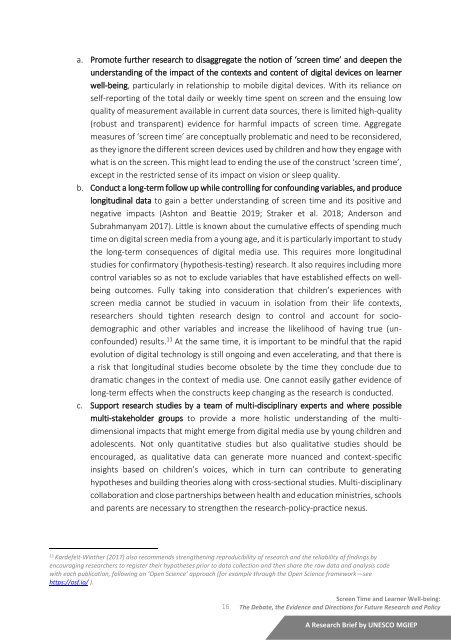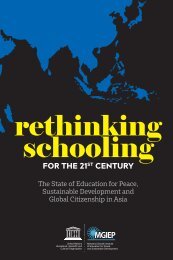Screen Time and Learner Well-being
The Debate, the Evidence and Directions for Future
The Debate, the Evidence and Directions for Future
Create successful ePaper yourself
Turn your PDF publications into a flip-book with our unique Google optimized e-Paper software.
a. Promote further research to disaggregate the notion of ‘screen time’ <strong>and</strong> deepen the<br />
underst<strong>and</strong>ing of the impact of the contexts <strong>and</strong> content of digital devices on learner<br />
well-<strong>being</strong>, particularly in relationship to mobile digital devices. With its reliance on<br />
self-reporting of the total daily or weekly time spent on screen <strong>and</strong> the ensuing low<br />
quality of measurement available in current data sources, there is limited high-quality<br />
(robust <strong>and</strong> transparent) evidence for harmful impacts of screen time. Aggregate<br />
measures of ‘screen time’ are conceptually problematic <strong>and</strong> need to be reconsidered,<br />
as they ignore the different screen devices used by children <strong>and</strong> how they engage with<br />
what is on the screen. This might lead to ending the use of the construct ‘screen time’,<br />
except in the restricted sense of its impact on vision or sleep quality.<br />
b. Conduct a long-term follow up while controlling for confounding variables, <strong>and</strong> produce<br />
longitudinal data to gain a better underst<strong>and</strong>ing of screen time <strong>and</strong> its positive <strong>and</strong><br />
negative impacts (Ashton <strong>and</strong> Beattie 2019; Straker et al. 2018; Anderson <strong>and</strong><br />
Subrahmanyam 2017). Little is known about the cumulative effects of spending much<br />
time on digital screen media from a young age, <strong>and</strong> it is particularly important to study<br />
the long-term consequences of digital media use. This requires more longitudinal<br />
studies for confirmatory (hypothesis-testing) research. It also requires including more<br />
control variables so as not to exclude variables that have established effects on well<strong>being</strong><br />
outcomes. Fully taking into consideration that children’s experiences with<br />
screen media cannot be studied in vacuum in isolation from their life contexts,<br />
researchers should tighten research design to control <strong>and</strong> account for sociodemographic<br />
<strong>and</strong> other variables <strong>and</strong> increase the likelihood of having true (unconfounded)<br />
results. 11 At the same time, it is important to be mindful that the rapid<br />
evolution of digital technology is still ongoing <strong>and</strong> even accelerating, <strong>and</strong> that there is<br />
a risk that longitudinal studies become obsolete by the time they conclude due to<br />
dramatic changes in the context of media use. One cannot easily gather evidence of<br />
long-term effects when the constructs keep changing as the research is conducted.<br />
c. Support research studies by a team of multi-disciplinary experts <strong>and</strong> where possible<br />
multi-stakeholder groups to provide a more holistic underst<strong>and</strong>ing of the multidimensional<br />
impacts that might emerge from digital media use by young children <strong>and</strong><br />
adolescents. Not only quantitative studies but also qualitative studies should be<br />
encouraged, as qualitative data can generate more nuanced <strong>and</strong> context-specific<br />
insights based on children’s voices, which in turn can contribute to generating<br />
hypotheses <strong>and</strong> building theories along with cross-sectional studies. Multi-disciplinary<br />
collaboration <strong>and</strong> close partnerships between health <strong>and</strong> education ministries, schools<br />
<strong>and</strong> parents are necessary to strengthen the research-policy-practice nexus.<br />
11<br />
Kardefelt-Winther (2017) also recommends strengthening reproducibility of research <strong>and</strong> the reliability of findings by<br />
encouraging researchers to register their hypotheses prior to data collection <strong>and</strong> then share the raw data <strong>and</strong> analysis code<br />
with each publication, following an ‘Open Science’ approach (for example through the Open Science framework—see<br />
https://osf.io/ ).<br />
16<br />
<strong>Screen</strong> <strong>Time</strong> <strong>and</strong> <strong>Learner</strong> <strong>Well</strong>-<strong>being</strong>:<br />
The Debate, the Evidence <strong>and</strong> Directions for Future Research <strong>and</strong> Policy<br />
A Research Brief by UNESCO MGIEP

















